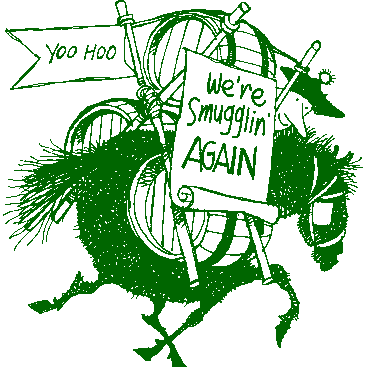 | for Excise Evasion |
 | for Excise Evasion |
 The word "excise" comes from the MiddleDutch excijs or exziis, meaning a duty charged on domesticallyproduced goods, especially alcohol, and the Dutch are creditedwith first introducing this cunning way of combining the puritanpurpose of controlling excessive drinking with raising revenue.The idea was taken up by Charles I's Treasurer, but the king wasexecuted before anything was done and it was his opponents, thePuritan Parliament of 1643, which imposed the first excise tax inthe British islands, at the rate of 8d the gallon. The ScottishCovenanting parliament adopted the same tactic the followingyear.
The word "excise" comes from the MiddleDutch excijs or exziis, meaning a duty charged on domesticallyproduced goods, especially alcohol, and the Dutch are creditedwith first introducing this cunning way of combining the puritanpurpose of controlling excessive drinking with raising revenue.The idea was taken up by Charles I's Treasurer, but the king wasexecuted before anything was done and it was his opponents, thePuritan Parliament of 1643, which imposed the first excise tax inthe British islands, at the rate of 8d the gallon. The ScottishCovenanting parliament adopted the same tactic the followingyear.
Interestingly, the "unjust and pernicious attempt toextort great payments from the subject by way of excise" wasone of Parliament's complaints to the king in the GrandRemonstrance of 1641. The following year, when it was rumouredthat parliament itself intended to introduce the tax, there was afurore and the House declared "that these rumours were falseand scandalous; and that their authors should be apprehended andbrought to condign punishment". Less than a year later thepoliticians did what they denied intending to do. Plus çachange...
The original imposition was for a year only: it has remainedever since. After the "Glorious Revolution" of 1688 thetax was increased considerably. At this time, Duncan Forbes ofCulloden, a leading Whig and supporter of William and Mary, hadhis distillery at Ferintosh (on the Black Isle) burnt byJacobites. In compensation he was allowed to distil free of dutyfrom grain grown on his own estate, in perpetuity, upon paymentof a trivial annual sum. By the late 1760s, Ferintosh wasproducing almost two-thirds of all the legally produced whisky inScotland - some 90,000 gallons - and the Forbes family was makingan annual profit equivalent to almost £2 million per annum intoday's money!
Following the union of the parliaments of England and Scotlandin 1707, duty on excisable liquors was levied at the same rate asin England and a Scottish Excise Board, manned by Englishofficials, was established in Edinburgh. The tax was now seen asan English imposition, and its evasion became something of apatriotic duty.
Until 1781 home distilling was perfectly legal, so long as thespirits were not sold. As excise duty became more onerous,increasing amounts of illicit whisky came onto the Lowlandmarket, mainly from the Highlands. To meet this competition, manylegal distilleries had to resort to fraud in their taxdeclarations, and in the attempt to prevent this the governmentpassed a series of increasingly complex and draconian measures.Their effect was simply to stimulate smuggling and discourageproducers from taking out licenses. In 1777, it was estimatedthat there were 400 illicit stills in Edinburgh. while there wereonly 8 licensed operations.
By the 1790s the situation was impossible. Illconceivedlegislation had reduced the quality of legal whisky, increasingthe demand for 'moonshine'. To raise money for the prosecution ofthe Napoleonic War the government imposed excise duties oneverything they could think of - bricks, candles, calico, paper,salt, soap, hides, etc - and "when they could no longer beincreased in number, they were raised in rate".
Meanwhile the smugglers became bolder and bolder. An officialReport of 1790 commented: "Travelling in bands of 50, 80 or100 or 150 horses remarkably stout and fleet [having] theaudacity to go in this formidable manner in the open day upon thepublic high roads and through the streets of such towns andvillages as they have occasion to pass".
The government was bereft of ideas about how to cope with thesituation. Duty was tripled in 1793, doubled again in 1795 andagain in 1800; further increases took place in 1804, 1811 and1814.
There was growing concern among landowners in the Highlandsabout the growth of violent crime, mostly associated with foodshortages, evictions and land clearances for sheep parks, butblamed on the "lawless smugglers". The 4th Duke ofGordon, one of the most powerful landowners in the north east,addressed the House of Lords on the subject in 1820, urging afurther reduction of duty and a more moderate attitude towardslegal distillers. In return, he pledged the landownersco-operation in putting down smuggling. A Commission of Inquiry(sic) into the Revenue was set up, and following its Report, thelaw was completely overhauled by the Excise Act of 1823, with aview to encouraging distillers to 'go legal'. Thus were thefoundations of the modern whisky industry laid.
If you have comments about thissite, please contact the